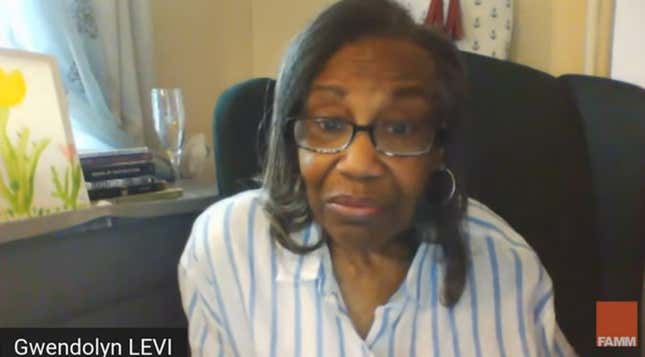
Last month, The Root reported that 76-year-old Gwen Levi, one of around 4,500 federal inmates who were released from prison and sent to home confinement during the coronavirus pandemic, was sent back into custody all because she missed phone calls from her supervisor while she was taking a computer word-processing class.
Because Levi was out of contact for more than four hours while she took the class, the Federal Bureau of Prisons listed her violation as an “escape” in its incident report, and Levi, who had been out of lockup for more than a year, was ordered back behind bars. Fortunately, a federal judge decided that sending her back to prison served no purpose in protecting society and granted Levi compassionate release.
Levi had already served 16 years out of her 24-year prison sentence for conspiring to sell heroin before she moved to Baltimore to live with her mother after she was released. The Washington Post reports that on Tuesday, Maryland U.S. District Court Judge Deborah K. Chasanow reduced her sentence to time served, making Levi a free woman once again.
Chasanow wrote in her ruling that Levi “has done well on home confinement, the current question of the missed call notwithstanding.”
“Because of her release to home confinement, the most pressing initial concerns (COVID, age, and health) were addressed,” Chasanow continued. “The court concludes that it would do little (if anything) to serve the goals of sentencing to require her to return to full custody.”
Chasanow also noted in her opinion that the Justice Department opposed Levi’s bid for compassionate release citing her “criminal history that includes prior felony drug-trafficking and firearms convictions.” But she also said the department acknowledged that Levi “likely does not pose a significant danger to the community,” which would lead any reasonable and empathetic person to wonder why the department would advocate keeping her locked up. Is prison about protecting the public from criminals, or is it just about punishing people who society deems undesirable?
After news of Levi’s release being revoked spread on social media and people who don’t believe that every incarcerated person is irredeemable expressed outrage at the callousness of our legal system, Justice Department spokesman Anthony Coley tweeted that “inmates who have had their transfer to home confinement revoked based on a violation may appeal that decision through the Administrative Remedy Program based on the particular circumstances of their case.”
Levi’s public defender Sapna Mirchandani, however, said that appealing the decision likely wouldn’t have worked.
“If Gwen stayed in the BOP’s custody, we would go the ‘administrative remedy’ route, which is a painfully long bureaucratic maze that, in my experience, is a waste of time,” Mirchandani said. “The BOP always backs up what the BOP does.”
According to her attorney, Levi will be required to report to a probation officer for the next five years, but after one year, she will be eligible to request early termination of supervision. Mirchandani also said the conditions for Levi’s release will be less restrictive than they were when she was released the first time, although she didn’t specify how those restrictions had loosened.

